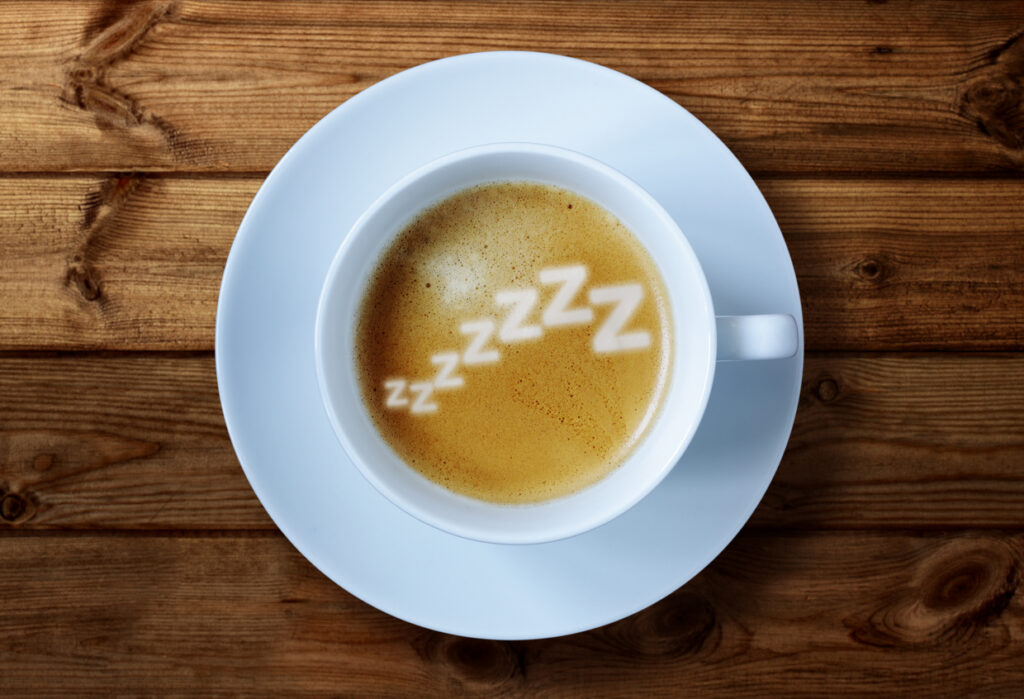blog
May 12, 2025
Coffee and Menopause: Time to Rethink or Refill?
Will coffee make my menopause symptoms worse?
Can it raise cholesterol or lead to weight gain?
Should I skip that first cup—or change how much I drink?
If questions like these have been on your mind, you’re not alone. Coffee is something many of us enjoy daily, but during menopause, it can leave us wondering whether it’s helping or harming our health.
Let’s take a closer look at what the science says.

Coffee and Menopause: More Than Just Caffeine
When we think of coffee, we often think of caffeine—the energising boost in the morning or that much-needed pick-me-up later in the day. And yes, caffeine can impact sleep, anxiety, and even hot flushes (more on that shortly).
But coffee is so much more than just caffeine.
It contains over 100 biologically active plant compounds, including chlorogenicacid, a powerful polyphenol, and soluble fibre, which supports gut and metabolic health.
While caffeine might not suit everyone, many of coffee’s health benefits come from its non-caffeine components so decaf coffee really does count here.
Coffee and Menopause Heart Health
Coffee and Menopause Blood Pressure
Although coffee (due to its caffeine) can cause a short-term rise in blood pressure longer-term studies suggest regular coffee consumption does not raise the risk of high blood pressure and may even lower it in some cases.
Coffee and Cholesterol: What Midlife Women Should Know
Coffee contains diterpenes (cafestol and kahweol), natural oils, that raise cholesterol levels but the amount found in coffee depends on your brewing method:
- Unfiltered coffee (e.g. French press, Turkish, or Greek) contains more diterpenes
- Filtered (drip or pour-over) and instant coffee remove most of these compounds
So if your cholesterol is high, or you’re concerned about your risk of a high cholesterol level then consider switching to a filtered or instant option.
Coffee and Menopause Heart Disease Risk
The relationship between coffee and heart disease is still being explored, but most studies suggest moderate coffee intake (2–4 cups/day) is safe and may offer protective benefits—particularly in reducing the risk of stroke.

Coffee and Type 2 Diabetes in Menopause
This is one of the strongest and most consistent findings in coffee research: regular coffee drinking is linked to a lower risk of developing type 2 diabetes.
Research shows that drinking around 3 to 4 cups of coffee a day is linked to a lower risk of developing type 2 diabetes compared to those who drink little or none. Even adding just one extra cup per day was associated with an 12% reduction in risk. This beneficial effect is found with both caffeinated and decaf coffee, suggesting it’s the plant compounds, not the caffeine that plays the key role.
For women living with type 2 diabetes, caffeinated coffee may raise blood sugar shortly after drinking but over the long-term coffee is associated with improved blood sugar control and better metabolic outcomes.
Longevity & Health Span
In addition to its link with lower risk of type 2 diabetes, moderate coffee drinking—around 1 to 5 cups per day—has been linked with a reduced risk of death from all causes.
Midlife is a time when the risk of chronic diseases begins to rise, often impacting overall quality of life. Hormonal changes during and after menopause can contribute to weight gain, insulin resistance, and blood sugar fluctuations, and women in midlife are at significant risk of developing type 2 diabetes.
This suggests that coffee could play a role in promoting healthier ageing and supporting a longer health span—helping you not only live longer but live well.
What Might Explain Coffee’s Protective Effect?
Researchers believe the answer lies, at least in part, in coffee’s polyphenols: Chlorogenic acid and lignans
These compounds may:
- Reduce inflammation
- Improve insulin sensitivity
- Enhance glucose uptake
- Support gut hormone balance
- Improve lipid metabolism
Coffee also supports a healthy gut microbiome—certain bacteria, like L. asaccharolyticus, thrive on the fibre and polyphenols found in coffee.
And remember: these benefits apply to decaf coffee too.

Coffee and Menopause Weight Gain: What’s the Link?
Some studies suggest coffee can slightly increase fat burning and may help with weight loss, but the effect is likely to be small. Interestingly coffee may help with appetite regulation by influencing hormones involved in hunger and fullness.
During menopause, hormonal changes make it easier to gain weight and harder to lose it—especially around the middle. If you want to learn more about this check out this blog on why we gain weight and change shape in menopause, which explores how hormones influence metabolism and cardiovascular risk. While coffee isn’t a magic solution, it may support metabolic health by improving blood sugar control.
Just be mindful of what you put with your coffee: sugar, syrups, and cream can easily offset the benefits.
Debunking the Cortisol Myth
You may have heard claims like:
“Coffee spikes cortisol, raises blood sugar, and causes weight gain—especially in menopause.”
This is a common social media myth, but it’s a huge oversimplification.
Yes, caffeine can briefly raise cortisol, the body’s stress hormone. But this doesn’t automatically mean fat storage or weight gain. The body is far more sophisticated and is able to handle short bursts of cortisol, and for regular coffee drinkers, this effect is often blunted due to adaptation to caffeine’s effects.
There is no strong evidence linking moderate coffee consumption to long-term weight gain.
Coffee and Menopause Symptoms: What to Know
Coffee may seem like a clear winner for metabolic health and healthy ageing—but it’s not without its downsides.
These tend to centre around caffeine, which can be more problematic during menopause, especially when symptoms like anxiety, poor sleep, and hot flushes are in the mix.
This is where we need to balance the benefits of coffee with how it might affect other important areas of health—especially sleep, which plays a huge role in weight management, mood, and overall wellbeing.
Coffee and Common Menopause Symptoms
Coffee and Anxiety in Menopause
Caffeine stimulates the nervous system and can increase feelings of anxiety, especially in those already prone to it.
If you feel jittery or restless, try:
- Reducing your caffeine intake (it’s best to do this gradually)
- Switching to decaf
- Sticking to caffeinated coffee only in the morning
Coffee and Hot Flushes
Caffeine can trigger or worsen hot flushes for some women—but not all. Track your symptoms and experiment with:
- Timing (earlier in the day)
- Lower doses
- Decaf alternatives
Coffee and Menopause Sleep Quality
Caffeine can make it harder to fall or stay asleep and can affect sleep quality, and menopause only magnifies this. Poor sleep affects energy, appetite, weight, and mood.
If sleep is a struggle, be mindful of the timing of your caffeinated coffee and or try decaf options to reduce the amount of caffeine.

Caffeine Tolerance and Menopause: Why Sensitivity May Change
While research is still limited, what we do know suggests our sensitivity to caffeine can increase as we age due to slower caffeine metabolism by the liver. That means the coffee habits that worked well in your 30s might feel quite different by the time you reach your 40s or 50s.
Caffeine Content of Common Drinks and Foods
Understanding how much caffeine you’re taking can help you make informed choices—especially if you’re sensitive to its effects on sleep, anxiety, or menopause symptoms. A caffeine intake up to 400 mg/day (around 4 cups/day) is considered safe but if you’re sensitive you will benefit from less than this and the timing is often very important.
If you’re considering cutting back on caffeine, it’s best to do it gradually. Reducing intake too suddenly can lead to symptoms like headaches, irritability, and jitters—so easing off slowly can help your body adjust more comfortably.
| Item | Serving Size | Approx. Caffeine Content |
| Espresso coffee | 60 ml | 80 mg |
| Filter coffee | 200 ml | 90 mg |
| Instant coffee | 1 cup | 100 mg |
| Decaf coffee | 1 cup | 2–15 mg |
| Black tea | 1 cup | 50 mg |
| Green tea | 1 cup | 30–50 mg |
| Matcha | 1 cup | 38–176 mg (19–44 mg per gram) |
| Cola | 330 ml can | 40 mg |
| Energy drink | 250 ml can | 80-160 mg |
| Milk chocolate | 50 g bar | 10 mg |
| Dark chocolate | 50 g bar | 25 mg |
Note: Caffeine content can vary considerable depending on brand, preparation method, and strength.
When You Drink Coffee Matters During Menopause
Caffeine stays in your system longer than many people realise.
About 50% of the caffeine from a cup of coffee can still be in your bloodstream 5 hours later – and for some women, it may linger even longer, depending on how quickly their body processes it.

So, if you drink coffee at 5 p.m., half of that caffeine could still be active at bedtime—and it may not fully clear from your body until the early hours of the morning. That lingering effect can make it harder to fall asleep, stay asleep, or get enough deep sleep—even if you don’t feel wired.
But not everyone is affected the same way. Some people are very sensitive to caffeine, while others can drink an espresso after dinner and sleep just fine. This comes down largely to genetics.
There are slow caffeine metabolisers (who feel the effects for longer) and fast metabolisers (who break it down more quickly) as its genetically determined (linked to the CYP1A2 gene).
If you’re dealing with sleep issues, jitteriness, or anxiety, it’s worth taking a closer look at your coffee habits. That said, these symptoms are also common during menopause due to hormonal changes—so they may not be related to caffeine.
Coffee and Menopause: The Bottom Line
How much coffee works for you in midlife is highly individual. Research shows enjoying 2–4 cups per day (regular & decaf) may offer health benefits, but it’s important to balance that with how it affects your sleep, mood, and menopause symptoms.
And if you don’t like coffee or choose not to drink it? That’s okay too – don’t feel you’re missing out by not drinking it – you can still get powerful plant compounds from a colourful, diverse diet full of vegetables, fruits, nuts, seeds, wholegrains, herbs, and spices.
Smart Coffee Habits for Menopause
If you enjoy coffee, there’s no need to give it up—but how you drink it can make all the difference. Here are some simple, evidence-informed tips to make coffee work for you in menopause:
☕ Think about the Timing
- Avoid caffeine at least 6–8 hours before bed. Maybe earlier if you’re sensitive
- Consider switching to decaf after midday, especially if sleep is an issue
🧬 Know your sensitivity
- If coffee makes you feel jittery, wired, or unsettled, you might be more sensitive to caffeine—something that can change with age and hormonal shifts
- Try gradually cutting back or tracking how you feel after different types and amounts
🌿 Choose your coffee wisely
- If cholesterol is a concern, opt for filtered or instant coffee instead of French press or traditional Greek/Turkish coffee
- Decaf coffee still contains beneficial plant compounds—so you can get the health benefits without the caffeine
Making changes in midlife doesn’t have to feel overwhelming. If you’d like some personalised support to get clear on what will truly help your habits, health, and weight, take a look at my Work With Me page to see how we can work together.